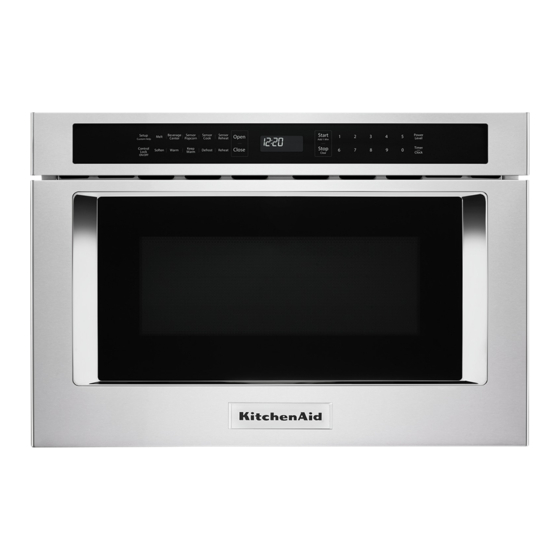KitchenAid KMBD104GSS0 Manuel d'utilisation et d'entretien - Page 7
Parcourez en ligne ou téléchargez le pdf Manuel d'utilisation et d'entretien pour {nom_de_la_catégorie} KitchenAid KMBD104GSS0. KitchenAid KMBD104GSS0 18 pages. Under-counter microwave oven drawer

End of Cycle Tones
Tones sound at the end of any cooking cycle unless turned off.
To Turn Off/On Sound: Touch SETUP twice, then touch START.
Reminder Tones
Tones sound every 10 seconds for 1 minute, then every three
minutes up to 1 hour. Touch STOP to stop the tones.
To Turn Off/On Reminder: Touch SETUP three times, then touch
START.
A magnetron in the microwave drawer produces microwaves
which reflect off the metal floor, walls, and ceiling and pass
through the turntable and appropriate cookware to the food.
Microwaves are attracted to and absorbed by fat, sugar, and
water molecules in the food, causing them to move, producing
friction and heat, which cooks the food.
To avoid damage to the microwave drawer, do not lean on or
■
allow children to swing on the microwave drawer door.
To avoid damage to the microwave drawer, do not operate
■
microwave drawer when it is empty.
Clothes, flowers, fruit, herbs, wood, gourds, paper, including
■
brown paper bags and newspaper, should not be dried in
microwave drawer.
The vent under the drawer must not be blocked. During
■
microwaving, steam may come out of the right side of
the vent.
It is normal for the exterior of the microwave drawer to be
■
warm to the touch when cooking or reheating.
Paraffin wax will not melt in the microwave drawer because it
■
does not absorb microwaves.
Use oven mitts or pot holders when removing containers from
■
microwave drawer.
Keep the microwave inlet cover clean: food residue can
■
cause arcing and/or fires (see the "Microwave Drawer Cavity"
section in "Microwave Drawer Care").
Baby bottles and baby food jars should not be heated in
■
microwave drawer. Transfer baby food to a small microwave-
safe dish and heat, stirring often.
Pierce skins of potatoes, apples, squash, hot dogs, and
■
sausages so that steam escapes while cooking.
Do not overcook potatoes. At the end of the recommended
■
cook time, potatoes should be slightly firm. Let potatoes
stand for 5 minutes to finish cooking.
Do not cook or reheat whole eggs inside the shell. Steam
■
buildup in whole eggs may cause them to burst, requiring
significant cleanup of microwave drawer. Cover poached eggs
and allow a standing time.
Tones
MICROWAVE DRAWER USE
Demo Mode
The Demo Mode is ideal for learning how to use the microwave
drawer. When Demo Mode is active, functions can be entered,
with real displays and tones, without actually turning on the
microwave generator (magnetron). While functions are operating
in Demo Mode, the light comes on, and the display counts down
the time quickly.
To activate Demo Mode: Touch SETUP five times, then touch
and hold START for 3 seconds.
To deactivate Demo Mode: Touch SETUP five times, then touch
START.
Tips are available for all automatic functions. To view tips, touch
HELP (Setup/Help) while "HELP" is lit in the display.
Food Characteristics
When microwave cooking, the amount, size and shape, starting
temperature, composition and density of the food affect cooking
results.
Amount of Food
The more food heated at once, the longer the cook time needed.
Check for doneness and add small increments of time if
necessary.
Size and Shape
Smaller pieces of food will cook more quickly than larger pieces,
and uniformly shaped foods cook more evenly than irregularly
shaped food.
Starting Temperature
Room temperature foods will heat faster than refrigerated foods,
and refrigerated foods will heat faster than frozen foods.
Composition and Density
Foods high in fat and sugar will reach a higher temperature, and
will heat faster than other foods. Heavy, dense foods, such as
meat and potatoes, require a longer cooking time than the same
size of a light, porous food, such as cake.
Help
7
